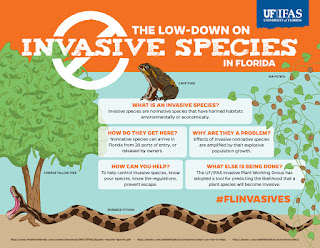weather, climate, and tacit admission of nerd status
While my study area focuses on a specific section of the big bend region of Florida (reminder: ANF and SMNWR) weather doesn't just happen in an isolated bubble despite what randomly searched internet photos will have you believe:
Thus while researching weather and climate links I included links that also give reference to the southeastern region. Water that falls in one area flows to another. Droughts in my study could influence salinity levels in the Gulf of Mexico. ̶T̶h̶u̶s̶,̶ ̶I̶'̶v̶e̶ ̶g̶r̶o̶u̶p̶e̶d̶ ̶m̶y̶ ̶r̶e̶s̶u̶l̶t̶i̶n̶g̶ ̶l̶i̶n̶k̶s̶ ̶i̶n̶t̶o̶ ̶t̶w̶o̶ ̶c̶a̶t̶e̶g̶o̶r̶i̶e̶s̶:̶ ̶r̶e̶g̶i̶o̶n̶a̶l̶ ̶a̶n̶d̶ ̶l̶o̶c̶a̶l̶i̶z̶e̶d̶.̶ While I had originally intended to group my findings like this, I learned as I explored that most of the sites I was finding particularly useful started at broad scales but users could drill down to local levels.
Links
Do you know what weather is? Do you know what climate is? No, you don't. This is why you should start here. While it's hosted out of North Carolina it has what I think is a great introduction to knowing what the heck we're experiencing wherever you might be when out of a climate controlled environment. It starts incredibly broad scale - think planetary tilt and solar system positioning. It later transitions to how we measure weather, how we measure climate, how things are/aren't changing, and everything in between. It has models. It has theories. It has everything you need to know to make your friends think you're a bona fide meteorologist.
Want to learn about El Niño? Yes, of course you do. In that case you should check out this link from NOAA. It has helpful graphics and does a great job of taking a broad issue and putting it into an easily digestible format.
If you can get past the particularly busy landing page of Climate Central, you can find usable information. I find this site particularly handy if you like infographics or are a visual learner. It's also particularly fun to play with their Digital Elevation Model (DEM). By fun of course, I mean depressingly overwhelming as you can see just how much land will be underwater as sea levels rise. If you play with the DEM, don't forget to open up the options settings and tailor the model with options such as "luck."
If you're a data junkie ( ̶n̶e̶r̶v̶o̶u̶s̶l̶y̶ proudly raises hand!), definitely check out the data access portion of NOAAs National Center for Environmental Information (NCEI). I freely admit to not knowing about this resource before using my best GoogleFu on this project. The main page for NCEI should be explored as a whole. Of particular interest are the climate reports for each year going back to 1998.
You'll notice that a lot of these links are NOAA related and that's no coincidence. NOAA of course is the part of the US Government that handles, among other things, conditions related to the oceans and the atmosphere. Many of the apps that you use on your mobile device are likely getting their raw data from NOAA and then interpreting it in their own way.
If you enjoy long, in depth, scientific type readings, or alternatively are having difficulty falling asleep, check out this page from the EPA. It has regional documents describing regional impacts of climate change and how said regions might adapt to it. It is somewhat dated being from 2013, but if you don't worry as much about the data and instead look at the themes, there are some insightful sections.
I mentioned at the beginning that most of the links I found useful were broad scale but could be refined to a particular site. Here is a rather specific example of this as you can access historical weather data by zip code. This link takes you to a sub page of climate.gov.
Bonus Category! Not weather, not climate, but fire!
The National Wildfire Coordinating Group (NWCG). NWCG is an organization that helps set the standards and facilitate cooperation of multiple agencies -- generally on large scale fires but sometimes other incidents as well. As part of this, they host InciWeb. Inciweb is a web portal that allows users to explore active fire incidents around the country. Given that large fires and local weather conditions are intimately related, and that wildfires can have climate impacts on regional and global scales, I felt the need to include the link.
Super Double Bonus: A brief read from NOAA on how wildfires impact climate.


Comments
Post a Comment